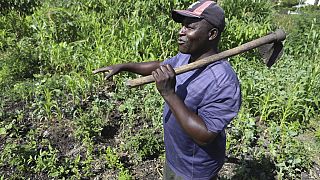Kenya
Joshua Kimwele is a worried man.
After more than 30 years of beekeeping, the current trends in the ecosystem are worrying.
And now, he is raising alarm bells over the rampant use of poisonous pesticides in agricultural practices.
These chemicals, intended to protect crops, are inadvertently decimating his bee populations.
“As other farmers continue to spray pesticides in their farms, they are finishing off the bees. It would be better if you must spray, do so in the evening or at night using a torch so that by morning, the potency of the chemical is low,” says Kimwele.
Despite his effort to protect his 5 acre piece of land from deforestation, charcoal burning in his area is depriving his bees of their natural habitat.
Rampant logging and land conversion for agriculture and urbanisation are shrinking the forests and disrupting the delicate balance of ecosystems.
“People have invaded the forests and are cutting down the trees which are rich in nectar. So I would wish that all those cutting down the trees for charcoal burning be banned totally. Because if they cut down all the trees, and you know, if there are no bees, we are also extinct,” Kimwele adds.
Worse still, Kenya has been facing natural disasters which have been growing in intensity and randomness.
During COVID 19, Kimwele like other Kenyans, lost a lot of business due to movement restrictions.
This was followed by a locust invasion coupled with a very severe drought.
But hope is in sight as the County Government is working on a restoration agenda for the farmers.
“As a county, we are working towards restoration of the lost glory. Making sure that we bring back our farmers to where they were. The invasion of locusts, the Corona that time, and that time we had also faced a serious drought. Therefore all this combined had devastating effects to our farmers and we want to restore their livelihoods,” explains Dr Stephen Mbaya, a Kitui County official.
Mbaya, who is the County Minister in charge of agriculture, says honey provides a reliable alternative source of income for local farmers.
“Beekeeping and honey is a source of income. And I can tell you 1 kilogram of honey fetches around 800 to 1500 Kenyan shillings. This is an alternative to our farmers. Its an alternative to planting crops, the expenditure you incur when you put your beehive compared to the expenditure of keeping other livestock or crops, for bees, it's very minimal.”
Kimwele and other beekeepers have formed a local beekeepers' group and their efforts are beginning to bear fruit.
Government officials have earmarked them for a Langstroth hive distribution program, as well as training and modern beekeeping tools.
They're being taught about bee management such as colony increment, queen rearing techniques, hygienic honey harvesting and packaging techniques.
The group - which mainly comprises women - also intends to change a culture where beekeeping is associated with men.
“We want to promote inclusion. We want to include women and youth in beekeeping. Traditionally in our area, beekeeping has been an activity undertaken by men, and mainly old men," says Timothy Wambua, a livestock production expert in Kitui County.
"With the Langstroth you can place them at a height where you don’t need to climb up into the trees," he adds.
Wambua says the Langstroth hives - vertically modular beehives - have further benefits, as they're easy to inspect and to treat diseases and pests, as new strains are reported locally.
Varroa mites and small hive beetles are new to the African beekeeper, these and other pests are now wreaking havoc on bee colonies, while foreign diseases like American foulbrood have also been reported and now pose a constant threat.
"Varoa mite is also new in our area, though its not widespread, we are concerned. We are concerned that it might affect our colonies in the very near future," says Wambua.
Controlling these pests and diseases may in the future require significant resources and expertise to support struggling beekeeping communities.
As the world grapples with the urgent need to protect pollinators and safeguard biodiversity, the plight of beekeepers in Kenya serves as a stark reminder of the interconnectedness of human activities and the natural world.
Failure to address these challenges could have dire consequences for not only Kimwele, but for Kenya's entire beekeeping industry, global food security and environmental health.











01:43
Anti-Corruption protests erupt in Uganda's capital, inspired by Kenya
01:07
Haiti: US ambassador visits Kenyan police, announces additional funds
01:00
Pics of the day: July 19, 2024
01:05
Kenya: Court suspends police ban on protests in Nairobi
01:10
Kenyan police arrest two more suspects in a serial murder case
01:06
Haiti: Kenyan police officers join local forces in reconnaissance tour of capital